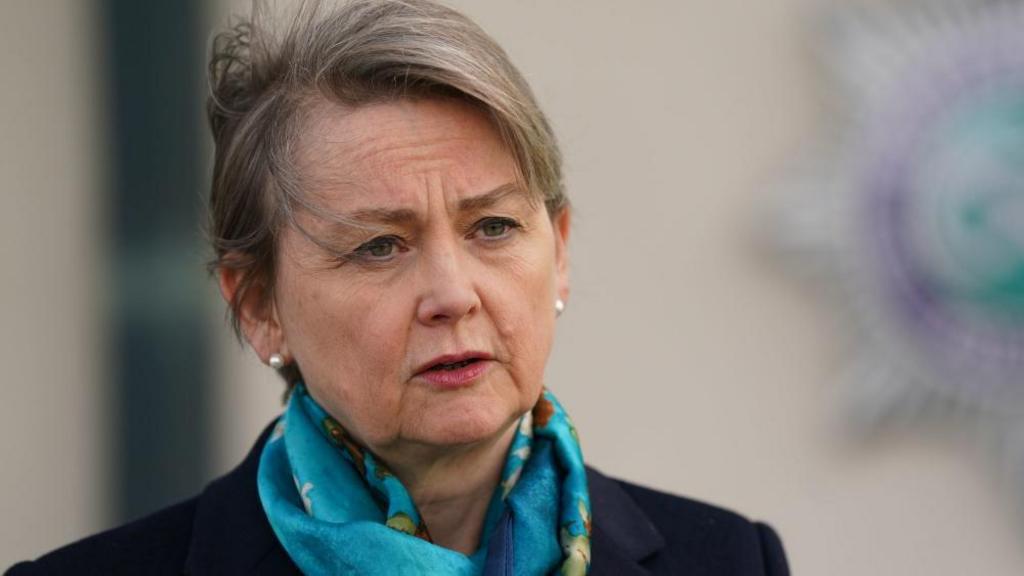As of Wednesday’s Spending Review, Home Secretary Yvette Cooper remains the only minister yet to finalize a funding agreement with the Treasury, according to BBC News sources.
Prior to this significant financial statement, which outlines departmental budgets for the next few years, ministers have engaged in extensive negotiations with Chancellor Rachel Reeves and her team.
Following productive discussions, Housing Secretary Angela Rayner reached a settlement Sunday evening; however, Cooper’s talks, involving Number 10, are still ongoing.
While police budgets are projected to see real-terms increases over the next three years, negotiations regarding the broader Home Office budget persist.
On Sunday, Technology Secretary Peter Kyle emphasized the need for police reform within the context of broader public service restructuring.
In an interview on the BBC’s Sunday with Laura Kuenssberg, Kyle highlighted the pressures faced across all sectors, noting the chancellor’s challenge in balancing competing demands for funding.
He confirmed increased spending for schools and scientific research, but avoided committing to the preservation of policing budgets.
Earlier reports suggested Home Office concerns over insufficient funds to recruit the 13,000 additional police and community support officers pledged in Labour’s manifesto.
Kyle affirmed the government’s £1bn investment in policing, adding, “We are delivering investment in the police. We expect the police to start embracing the change they need to do their bit for change as well.”
When questioned about the government’s target of 1.5 million new homes by the end of the parliamentary term, Kyle declined to guarantee budgetary protection for Rayner’s housing department.
However, he reiterated the government’s commitment: “We made a manifesto commitment. We are absolutely laser-focused on delivering that.”
These last-minute negotiations precede a critical week for all government departments.
Increased NHS funding is anticipated, with reports suggesting a substantial allocation for the Department of Health.
Such substantial NHS investment would necessitate budgetary reductions elsewhere, as the chancellor aims to comply with fiscal rules mandating no borrowing for day-to-day spending and a decrease in national debt as a percentage of national income by 2029/30.
Consequently, some departments will experience budget constraints as the chancellor adheres to her fiscal guidelines, which prohibit borrowing for day-to-day expenses and require a decrease in national debt as a percentage of national income by 2029/30.
Several aspects of the upcoming statement have been revealed in recent days.
Sunday night saw the government announce £24m in funding to enhance AI education in schools, part of a broader £187m tech skills initiative.
Earlier Sunday, an £86bn science and technology package was unveiled, funding advancements in drug treatments and battery technology.
On Wednesday, a £15.6bn investment in transport upgrades across Greater Manchester, the Midlands, and the North East was announced.
These spending decisions are made within the framework of a commitment to increase defense spending to 3% of GDP by 2034.
The government has already committed to raising defense spending from 2.3% to 2.5% of GDP by 2027—an additional £5bn annually—financed by cuts to the overseas aid budget.
Reeves confirmed a reversal of the controversial decision to restrict Winter Fuel Payments to recipients of means-tested benefits.
While the Spending Review will offer some information on payment eligibility, complete details will be released during the Budget later this year.
The Institute for Fiscal Studies notes that relatively modest growth necessitates difficult trade-offs.
The think tank suggests that health spending levels will determine whether cuts affect “unprotected” areas—those outside of health, defense, and education.
Amid ongoing funding negotiations, Science and Technology Secretary Peter Kyle urges police to embrace necessary reforms.
The Chancellor faces difficult decisions regarding budget allocation across various government departments.
This week’s Spending Review presents an opportunity for the UK government to showcase its vision to investors.
It will allocate funding to public services for three years and establish infrastructure budgets for four years.
A £20bn project to construct the Sizewell C nuclear power station could receive approval on Wednesday.

